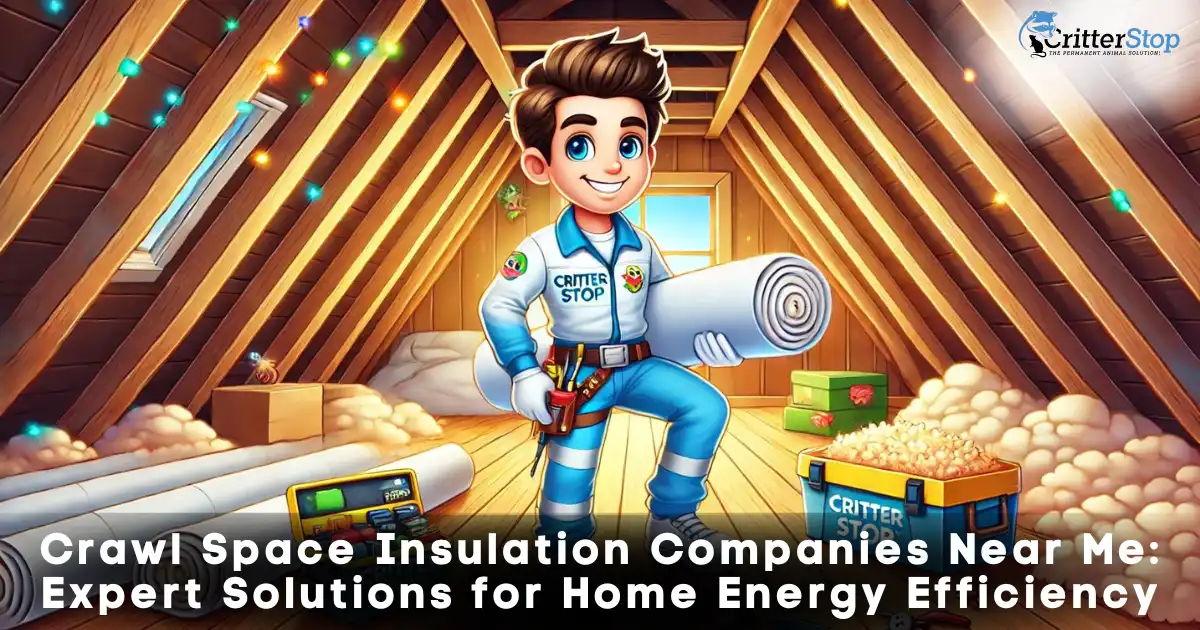
Insulating crawl spaces is essential to preserving a home's comfort and energy efficiency. Finding reliable crawl space insulation companies nearby can make a significant difference in managing energy costs and improving indoor air quality. Homeowners seeking local services can benefit from professional expertise to ensure their crawl spaces are properly insulated and protected against moisture and temperature fluctuations.
Numerous businesses that offer services ranging from consultation to insulation material installation are specialists in crawl space insulation in many different regions. By investigating these businesses, homeowners can evaluate offerings, examine client testimonials, and identify the most suitable option for their particular requirements. This approach not only enhances the home’s energy efficiency but also supports long-term structural integrity.
For those unsure where to start, exploring local listings or seeking recommendations can uncover reputable insulation companies in the area. Understanding what each one offers provides valuable insights, enabling homeowners to make informed decisions about their crawl space insulation needs.
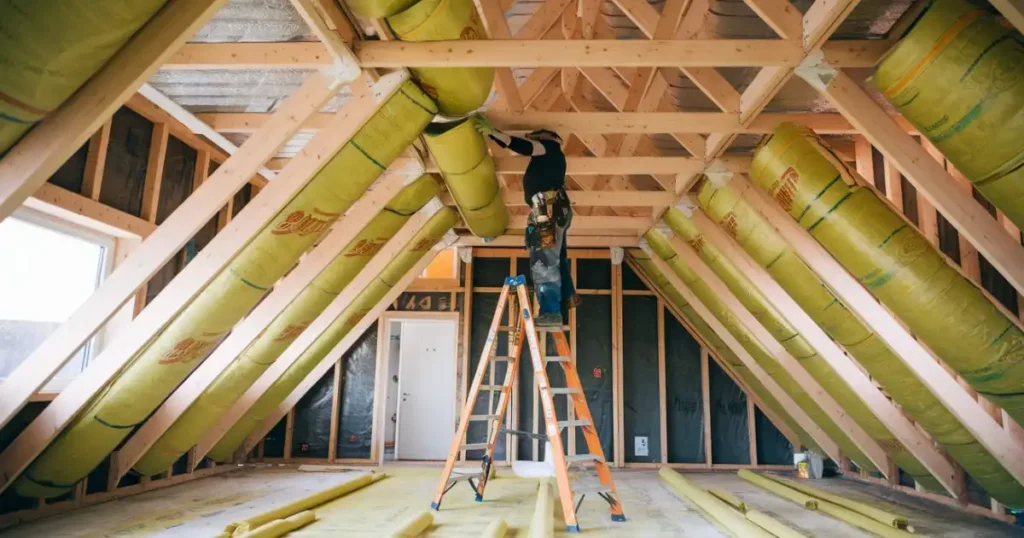
Insulating crawl spaces is essential to keeping a house energy efficient. Energy costs are decreased and heat loss is minimized with proper insulation. It also aids in avoiding moisture problems, which can give rise to the growth of mold.
Types of Crawl Space Insulation:
Choosing the right type depends on factors like local climate, budget, and the specific needs of the home.
Benefits of Crawl Space Insulation:
Those considering insulation should evaluate local companies that specialize in crawl space solutions. These professionals can assess the space and recommend suitable insulation options.
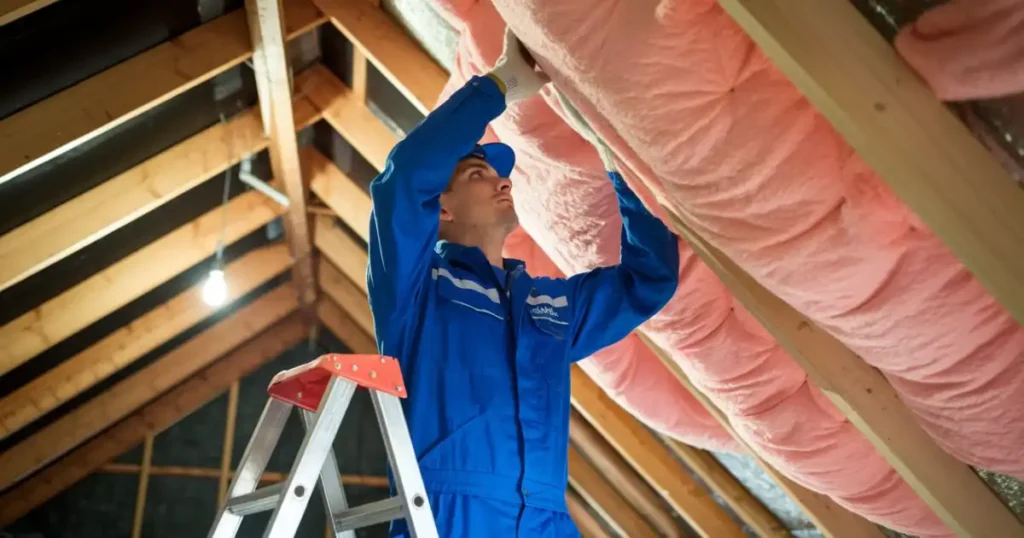
Crawl space insulation comes in various forms, each with distinct characteristics and benefits. The right kind should be chosen based on your needs, your budget, and the climate. This is a summary of the most popular choices.
Because fiberglass batt insulation is inexpensive and simple to install, it's a popular option for crawl spaces. The material consists of fine glass fibers, which trap air and provide thermal resistance.
Installation typically involves placing batts between joists. This method allows for a snug fit, minimizing gaps where air can infiltrate.
Cost: The cost of fiberglass batt insulation is generally low, proper installation is crucial to ensure effectiveness.
Rigid foam insulation panels are another effective solution for crawl spaces. Made from polystyrene or polyurethane, these panels boast high R-values per inch, making them efficient at reducing heat loss.
They can be installed on the walls of the crawl space, providing a barrier against moisture. This method also helps prevent mold growth by keeping the space drier.
Spray foam insulation is a premium choice because of its excellent air sealing qualities. When applied, it expands to form an airtight seal that keeps moisture and drafts out.
It is possible to apply this kind of insulation to floors, walls, and even difficult-to-reach places. It greatly increases energy efficiency, which lowers heating and cooling costs.
Cost: The cost to spray foam crawl space insulation usually varies per square foot, depending on factors like thickness and installation complexity.
Reflective insulation, or radiant barrier, works by reflecting radiant heat away from the crawl space. This type is especially beneficial in warmer climates where cooling costs are a concern.
Typically installed on the underside of the roof or walls, reflective insulation reduces heat gain and can make the crawl space cooler.
Cost: This insulation generally varies per square foot. While it may not provide the same thermal resistance as other types, it can enhance overall energy performance when used in conjunction with other insulation methods.
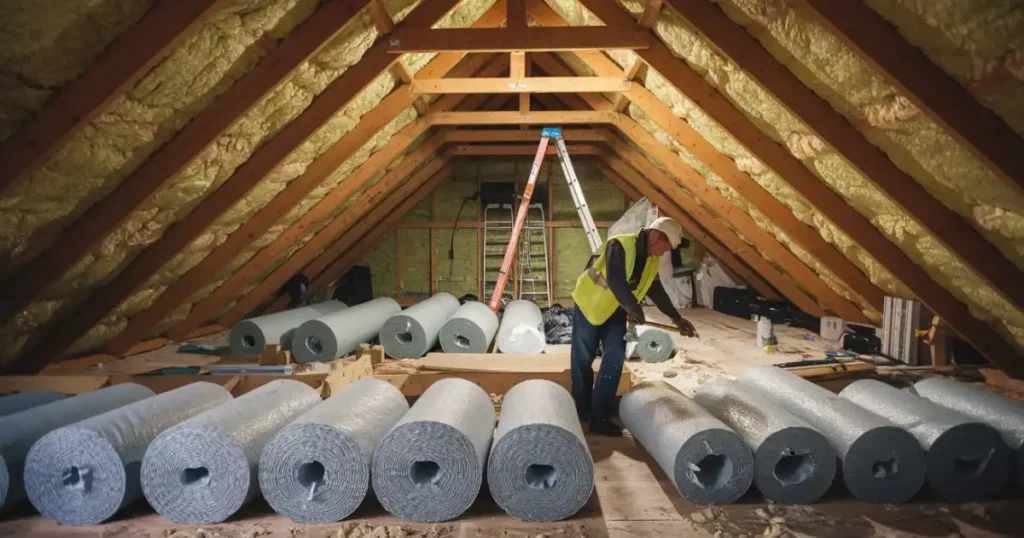
Assessing a crawl space involves identifying moisture levels, ventilation effectiveness, and overall energy efficiency. This evaluation helps homeowners make informed decisions about necessary improvements.
A crawl space's moisture can cause major issues like mold growth and structural damage. Homeowners should inspect for signs of dampness, such as water stains or musty odors.
Accurate measurements can be obtained by using a moisture meter. A relative humidity level above 60% may indicate a need for intervention.
Additionally, check for sources of water intrusion. Landscaping should slope away from the house and gutters should divert water away from the foundation. Further defense against moisture intrusion can be provided by installing a vapor barrier.
Proper ventilation is vital in maintaining a healthy crawl space environment. Insufficient airflow can trap moisture, leading to mold and decay.
Homeowners should evaluate existing vents to ensure they are unobstructed and functional. Ideally, vents should be placed on opposing walls to facilitate cross-ventilation.
If vents fail to provide adequate airflow, consider options like powered fans or passive ventilation systems. Insulation materials used should be moisture-resistant to avoid degradation.
An effective ventilation system can significantly impact indoor air quality by reducing humidity levels.
Evaluating the crawl space's energy efficiency may help you save money on your utility costs. The amount of insulation in the walls and floors should be inspected by homeowners.
Insulation should be continuous and not compressed. Materials like fiberglass or spray foam can provide excellent thermal resistance.
An energy audit can identify air leaks, which often occur around ducts or plumbing penetrations. Sealing these leaks can improve efficiency.
Using a thermal imaging camera can highlight areas where heat loss occurs, guiding necessary upgrades or repairs. Investing in crawl space upgrades enhances overall energy efficiency and comfort.
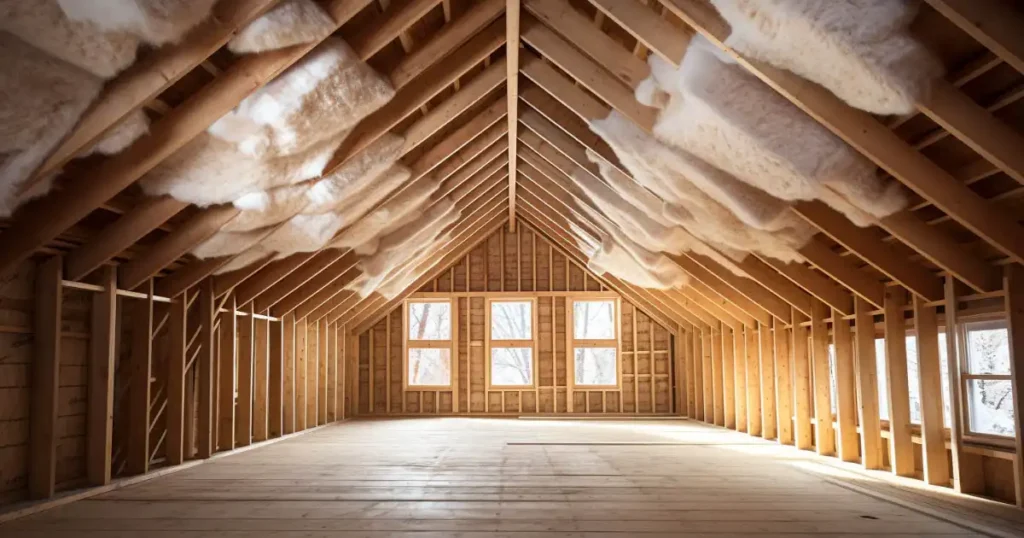
The insulation installation process requires careful preparation, effective application techniques, and adherence to safety measures. Every step helps the insulation work as a whole to provide the best possible energy efficiency and comfort in homes.
Preparation is crucial for a successful insulation project. Before installation, a thorough inspection of the crawl space is conducted. This includes checking for moisture issues, air leaks, and existing insulation conditions.
A well-prepared crawl space minimizes future problems and enhances insulation performance.
Different methods can be employed depending on the insulation material chosen. Spray foam, rigid foam board, and fiberglass batts are common materials.
Each method has its own cost implications. For example, the cost to spray foam crawl space can vary based on the size of the area and foam thickness.
Safety is paramount during installation. Gloves, masks, and goggles are examples of the proper personal protective equipment (PPE) that employees should wear.
Key safety measures include:
Adhering to these safety guidelines protects both workers and homeowners throughout the insulation process.
Understanding the costs associated with crawl space insulation is essential for homeowners exploring their options. Various factors influence these expenses, from material choices to installation methods. Cost estimates for specific insulation types and practices for reducing expenses will be discussed.
The price of crawl space insulation is influenced by a number of important factors. These consist of the size of the crawl space, the type of insulation material selected, and the climate of the area. For example, spray foam insulation is typically more costly than fiberglass batts but provides better moisture resistance and air sealing.
Labor costs can also vary significantly based on local market rates. Older homes may require additional preparation, which can increase installation expenses.
Other considerations include accessibility to the crawl space and any necessary repairs to existing structures. These factors can result in additional time and labor, thus elevating the total price.
Costs for insulating a crawl space can vary widely based on the chosen materials and installation methods. Although spray foam insulation is more expensive its advantages might make the cost worthwhile.
Additional expenses might include moisture barriers.
For a typical crawl space of 1,000 square feet, the total insulation cost may vary depending on the factors mentioned and any added services or materials.
To manage expenses effectively, homeowners can consider several cost-saving practices. One effective approach is to compare multiple quotes from insulation companies. This can help identify competitive pricing and ensure a fair deal.
Selecting the right insulation type based on specific needs can lead to savings. For example, using fiberglass batts may be more budget-friendly for less humid areas, while spray foam can save money on energy bills in more challenging climates.
Additionally, you can avoid future expenses by taking care of any necessary maintenance or repairs before installing. Incentives for energy-efficient homes may be available to homeowners on a local or federal level, further lowering overall costs.
Selecting a reliable insulation company is essential for ensuring proper installation and performance. It involves evaluating certain factors that demonstrate competence and customer satisfaction.
Looking for a company that holds the necessary licenses and certifications is crucial. Licensed companies comply with state and local regulations, ensuring that they meet the required standards.
A dedication to quality is also demonstrated by certifications from reputable associations (such as the Insulation Contractors Association of America). Customers can feel reassured by these credentials that the technicians have received the necessary training and are aware of industry best practices.
Before hiring, customers should ask for proof of licensing and inquire about any specific certifications the company holds. This step helps avoid potential issues related to improper installation or substandard materials.
Testimonials and reviews from customers provide insightful information about a business's reputation. Reviews from prior customers can be found on websites like Google, Yelp, and Angie's List.
Positive reviews typically highlight aspects like workmanship, punctuality, and customer service. Companies with numerous positive reviews are likely to provide satisfactory service. When reading feedback, it is essential to consider the context and frequency of comments.
Negative reviews may point to potential red flags, such as delays or lack of communication. A thorough evaluation of customer feedback will help in making an informed decision.
When evaluating insulation companies, it's essential to assess the range of services they provide. Companies may offer different types of insulation materials, such as fiberglass, spray foam, or cellulose.
Additionally, some companies may specialize in crawl space encapsulation, air sealing, and moisture control. Understanding the specific services helps customers determine if a company meets their insulation needs.
It is beneficial to request detailed estimates from multiple companies. This not only compares costs but also highlights the variety of services available. Choosing a company that aligns with specific requirements ensures a more satisfactory outcome.
Maintaining crawl space insulation is essential for ensuring its effectiveness and longevity. Key aspects include conducting routine inspections, managing pest issues, and addressing moisture control to prevent damage.
Regular inspections are critical for identifying issues before they escalate. At least twice a year, homeowners should inspect the crawl space for wear, damage, or deterioration.
Key areas to inspect include:
Taking notes during inspections can help in tracking changes over time. Addressing problems early can save significant repair costs down the line.
Pests can cause considerable damage to insulation materials and the structure itself. Common pests include rodents, termites, and pests that thrive in humid environments.
To mitigate pest issues:
Regular monitoring is essential. If infestations occur, consulting a pest control professional may be necessary to ensure proper elimination and prevention.
Moisture management is crucial for preserving insulation and preventing mold growth. Excess moisture can lead to insulation degradation and health problems.
Effective strategies include:
Homeowners should monitor for signs of mold, such as discoloration or musty odors. Prompt action can prevent significant issues, ensuring the insulation remains effective and the crawl space remains healthy.
Insulating crawl spaces has significant environmental implications. Proper insulation can reduce energy consumption, leading to lower greenhouse gas emissions.
Materials Used
Many companies utilize eco-friendly insulation materials. Options include:
Cost to Spray Foam Crawl Space
The cost of spray foam insulation generally varies per square foot. This varies depending on the application's complexity and location. Even though initial costs might be higher than with other materials, over time, energy savings can make up for the difference.
Energy Efficiency
Effective crawl space insulation helps maintain consistent indoor temperatures. Over time, this may result in a decreased need for heating and cooling systems, hence lowering energy expenses.
Moisture Control
Proper insulation also aids in moisture control, preventing mold growth. This contributes to healthier indoor air quality.
Choosing the right insulation method is crucial not only for comfort but also for environmental sustainability.
Several important considerations arise when selecting crawl space insulation companies. Answers to common queries address how to find reputable providers, cost expectations, types of insulation, and factors to weigh when hiring a contractor.
Searching for high-rated companies can involve checking online review sites such as Google, Yelp, or Angie's List. Homeowner forums and social media groups may also provide recommendations from local residents. Asking for referrals from friends or family who have had insulation work done can yield trustworthy results.
The costs for insulating a crawl space typically varies depending on size and insulation type. Factors influencing pricing include labor costs, materials chosen, and whether existing insulation needs removal. Adding vapor barriers or encapsulation can increase overall expenses.
Foam board insulation and spray foam are often considered the most effective for crawl spaces due to their energy efficiency and moisture resistance. Fiberglass batts are also common but may require additional moisture control measures. The choice may also depend on the climate and specific conditions of the crawl space.
Take into account a contractor's experience, credentials, and client testimonials when choosing one. Inquiring about labor and material warranties is also crucial. Comparing services and prices can be facilitated by getting multiple estimates.
Many local insulation companies offer free estimates for crawl space insulation. These estimates often include an evaluation of the space and recommendations tailored to specific needs. Contacting multiple companies can help ensure a comprehensive understanding of options and costs.
Encapsulation can lead to improved energy efficiency, reduced moisture, and better air quality in the home. This process typically varies depending on the size and specifics of the area. Benefits also include pest control and a more usable storage space.
When seeking crawl space insulation services, Critter Stop stands out as a trusted option. Known for professional and humane wildlife removal, they also offer insulation solutions tailored to specific needs.
To get started, a simple phone call to (214) 234-2616 will connect you with Critter Stop’s knowledgeable staff. They provide a free inspection, assessing the situation thoroughly.
Critter Stop has a fantastic reputation, highlighted by numerous positive customer reviews. Their commitment to high-quality work and exceptional customer service makes them a top choice.
For anyone needing insulation services, Critter Stop’s reputation ensures peace of mind and reliable results. Contacting them for a free inspection is a proactive step toward a well-insulated and pest-free environment.
Visit our Critter Library and learn more about our furry friends